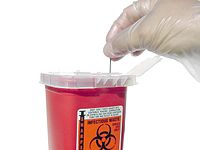
Photo from wikipedia
BACKGROUND Sharp injuries are common reasons for the transmission of blood-borne diseases in acute care settings. Fear of sharp injuries and their consequences can expose nurses to high levels of… Click to show full abstract
BACKGROUND Sharp injuries are common reasons for the transmission of blood-borne diseases in acute care settings. Fear of sharp injuries and their consequences can expose nurses to high levels of stress (sharp injuries stress). AIM AND OBJECTIVES To examine the occurrence of sharp injuries and to assess their relationship with stress among nurses working in acute care settings. DESIGN This was a cross-sectional study. METHODS A total of 150 nurses working in 10 acute care settings in two selected hospitals in Alexandria, Egypt, were selected as the population of this study. Data on the occurrence of sharp injuries were collected using a sharp injuries circumstances questionnaire (including questions regarding number, instrument and reasons/procedures that caused sharp injuries, etc.), and two scales were used to measure sharp injuries stress (the Impact of Event Scale-Revised and the Post-Traumatic Stress Syndrome Questions Inventory). RESULTS More than 13% of nurses experienced sharp injuries, and 25% of injuries were caused by contaminated instruments. Sharp injuries stress scores were high in nurses, with 65% of nurses experiencing sharp injuries and 30.8% of nurses who did not experience sharp injuries having high Impact of Event Scale-Revised scores. In addition, 45% of nurses who experienced sharp injuries and 15.39% of nurses who did not experience sharp injuries had high Post-Traumatic Stress Syndrome Questions Inventory (PTSSQI) scores. There was a significant relationship between the occurrence of sharp injuries and stress scales at P < .05. CONCLUSIONS Nurses are exposed to sharp injuries, leading to sharp injury stress pre- and post-occurrence of injuries. Sharp injuries stress can make nurses prone to Post-Traumatic Stress Syndrome (PTSS). RELEVANCE TO CLINICAL PRACTICE Factors that lead to the occurrence of sharp injuries and sharp injuries stress should be investigated, and a psychological rehabilitation unit should be instituted to help nurses working in acute care settings deal with the sharp injuries-related stressors they are facing.
Journal Title: Nursing in critical care
Year Published: 2021
Link to full text (if available)
Share on Social Media: Sign Up to like & get
recommendations!